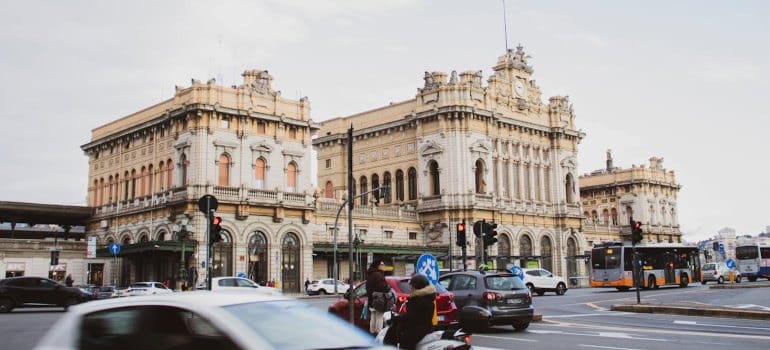Adjusting to Life in Italy: What to Expect in Your First Year

Get a Free Moving Quote Now!
Start Your International Moving Journey





Many dream of a new life in Italy, where furniture and fixtures have their own hilarious, maddening vocabulary—thanks to the literality of Google Translate—but they can trade New York’s skyscrapers for terracotta rooftops and crowded city streets for streets far less crowded with traffic but rife with gossip. The first year combines excitement, challenges, and substantial personal growth.
With assistance from international moving services providers such as International Sea & Air Shipping, shipping and logistics can be planned with greater ease so that you can pay attention to your new experiences.
Here are some realistic expectations for most newcomers during their first year in Italy.
Months 1–3: Arrival, Settling In, and Early Culture Shock
Finding Your First Home
The language, the pace, and even the airport atmosphere all make you feel like you’re starting over as soon as you land in Italy. It’s an elegant arched shopping gallery with people passing through, and somehow it’s a perfect summary of adjusting to life in Italy.

Online property portals have virtual tours that can help you shortlist, but you still need to speak with local agents and get recommendations from people in your area. Setting up utility service for items like electricity, gas, and the internet is a process of patience in Italy, and you may require Italian paperwork to do it. Have photocopies of your passport, codice fiscale, and residency documents ready.
Early Culture Shock
Your first few weeks might feel like too much. Daily life in NYC is different:
- IIn many towns, shops close for lunch breaks
- Bureaucracy operates independently
- Greetings are more personal
- Your most valuable asset is your patience
This time is normal and won’t last long. Things will get easier as routines develop.
Months 3–6: Learning the Culture, Language, and Daily Routines
Understanding Social Norms
Italy values connecting with people. People talk longer, gestures are more important, and interactions feel warmer. You will see:
- Shaking hands in a business setting
- Friends kiss each other on the cheeks twice
- Longer hellos and goodbyes
- Close enough to talk
Pay attention to and follow local cues—Italians value effort and honesty.
Setting Up Daily Life
Your daily habits start to change:
- Espresso and a pastry are common breakfast foods
- People eat lunch slowly and sometimes at home
- Dinner is later, usually after 8 p.m
- Some stores may close for riposo at noon
Shopping for groceries is no longer a hassle. Markets offer produce, cheese, and meats in season. Vendors love to give cooking advice, and by asking what’s fresh, you might stumble on something new.
Improving Your Italian Skills
Learning Italian increases comfort in everyday activities. Even ordering food, asking for directions, or booking an appointment is simplified. Even a basic understanding of Italian can boost your confidence. Start with salutations and terms that you use in everyday life.
Cafés, markets, and train stations are excellent places to practice. Learning new words can be facilitated by community classes, apps, and language exchanges. Enjoy the little successes; every small talk is a victory.
Months 6–9: Navigating Transportation, Bureaucracy, and Healthcare
Getting Around
In big cities, public transportation is reliable. There are fast trains and quick connections, allowing you to see a lot of Italy in no time at all. Buses and trams are available in most cities, but smaller towns’ populations rarely have many options.
Driving in the U.S. is different than driving here:
- There are many roundabouts.
- ZTL zones make it harder to get into historic centers
- There may not be enough parking
- A lot of people who live here walk or bike for convenience

Health Care and Medical Logistics
Public health care is pretty good in Italy, and thanks to the SSN (Servizio Sanitario Nazionale), you can get everything you need for free (if you’re a regular Italian person, not if you’re a non-EU immigrant and one without a job, though, unfortunately).
You step into clinics and hospitals once you register at that nearby health office. Some new people also get private insurance so they can see a doctor who speaks English or get an appointment faster.
Pharmacies are very helpful for small problems, and they are a bigger part of everyday health care than they are in the U.S. If you have a long-term illness, bring your medical records with you and keep your prescriptions up to date.
Months 9–12: Making Connections and Feeling at Home
Building a Social Circle
By this stage, most newcomers begin forming genuine connections. Friendships often start informally—at the coffee corner in your neighborhood, a local market, or community events. Joining sports clubs, photography groups, volunteer programs, or cooking classes can also help build relationships.
Expat communities can also ease the transition. They provide:
- A support network
- Help navigating paperwork
- Cultural events
- Honest advice from those who’ve lived the same experience
These groups offer reassurance when challenges arise and help you feel less alone.
Understanding the Emotional Curve
The first year typically includes:
- A honeymoon phase of excitement
- A dip as bureaucracy, language, and cultural differences feel heavy
- A turning point where routines become comfortable
- A sense of belonging as the year closes

It may feel homesick at first, but once you learn local customs, make friends, and explore, it becomes bearable.
What Your First Year Ultimately Looks Like
By the end of your first year in Italy, the unfamiliar turns into routine. You’ll know your favorite café, understand regional quirks, and recognize local schedules. Your Italian will be stronger, your comfort level higher, and your anxieties smaller.
The journey is rarely perfect—but always rewarding. Every obstacle is a lesson, and every day reveals more about life in Italy. And if you are patient, curious, and open-minded, before you know it, Italy will be home.
Your first year is building the foundation for a memory you’ll never forget—a lot of growth, discovery, and the beauty of becoming accustomed to life in Italy.
